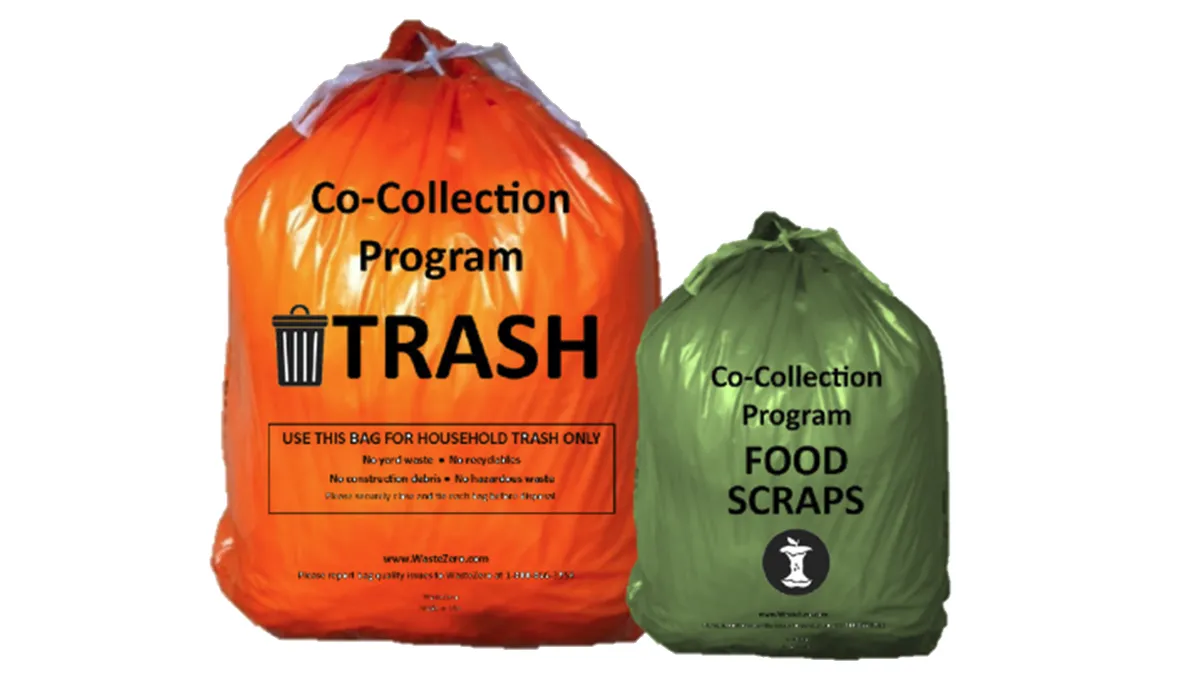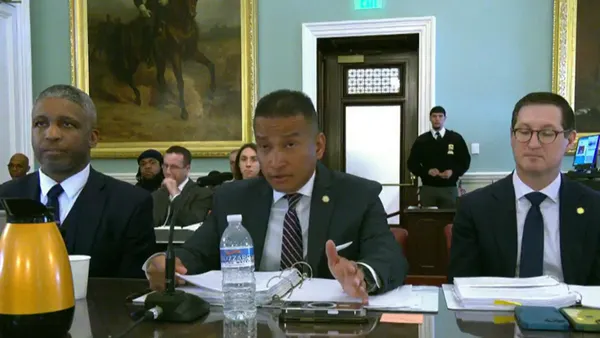Dive Brief:
- Middletown, Connecticut, voted to approve an organics co-collection program last week, codifying what it touts as the nation's first such permanent program with unit-based pricing. The program would apply to members of the city’s sanitation district.
- The city has engaged in a pilot of the system for nearly a year, along with a dozen other Connecticut municipalities, through a program sponsored by the state’s Department of Energy and Environmental Protection. Residents purchase green food waste bags and orange "save-as-you-throw" bags and place them in their existing curbside waste bins. A sorting facility run by EarthLoop separates the two types of bags.
- Officials in Middletown expect the system to reduce waste tonnage by 55%. By commingling the bags and adding them to existing collection routes, the town can cut out the typical added cost of an organics collection route, a common barrier to entry for municipalities, said Mark Dancy, president and founder of WasteZero, which helps coordinate the program.
Dive Insight:
Connecticut has faced difficult questions about the future of its waste management following the closure of the Materials Innovation and Recovery Authority, which included a waste-to-energy facility that had a capacity of 720,000 tons of waste per year.
In 2022, the state launched its first co-collection pilot in Meriden in conjunction with the Connecticut Coalition for Sustainable Materials Management, which was convened to move the state away from landfilling and incineration.
Following the success of the Meriden program, DEEP expanded the pilot opportunity to additional municipalities, including Middletown. Last fall, local officials announced the town had received a $350,000 grant from the state to begin its co-collection program. In the pilot, residents and small businesses were given a year's supply of collection bags, doled out weekly.
After nine months of the pilot, officials felt the program was so successful that they advocated to make it permanent, said Kristen Brown, vice president of waste reduction strategy at WasteZero.
"Residents are adapting to it, they're figuring it out," Brown said. “Probably the biggest comment [city leaders] get from residents is they didn't realize how many food scraps they had in the first place.”
When the program becomes permanent in November, residents will pay $1.65 for large waste bags and $1.00 for small waste bags, while large food scrap bags will cost 25 cents, according to a city fact sheet. The bags are then transported to an EarthLoop sorting facility at the site of a former Covanta-run facility in Wallingford, Connecticut.
Brown said sorting the co-collection bags in a MRF costs 20% to 25% of what it would cost to have a separate route. Other options, like adding organics to a yard waste collection route, don't work in Connecticut, where such services are only offered seasonally, she said. Once sorted, the food waste is sent to an anaerobic digester while the waste continues to be sent to an out-of-state landfill.
The city will continue to maintain curbside recycling services as well.
WasteZero’s leadership team said friction with implementing unit-based pricing most often comes from residents who don’t see the cost of waste when it’s paid for with their taxes. But in Middletown, residents in the sanitation district had previously paid a $400 waste cart fee. In the new pay-as-you-throw system, the town is able to reduce the overall fee while passing along tipping fees in the price of the bags. As a result, Dancy said up to 85% of residents would see their overall cost for waste fall.
Middletown Mayor Benjamin Florsheim said he was proud of residents for “taking a leadership role on this issue.”
”It’s revolutionary but so simple” Florsheim said in a statement on Tuesday. “With no additional trucks, no additional carts and no additional carbon footprint, we will be able to recycle the city’s food scraps and convert them to clean energy at the local anaerobic digester.”
WasteZero hopes the pilot will continue to sprout new, permanent programs elsewhere in the state. With enough participation, the group said the bags themselves could even be recycled. Meanwhile, a waste and recycling bill passed by Connecticut this year calls for expansion of organics separation at facilities like hospitals and schools, potentially diverting up to 45,000 more tons of organic waste from disposal.















